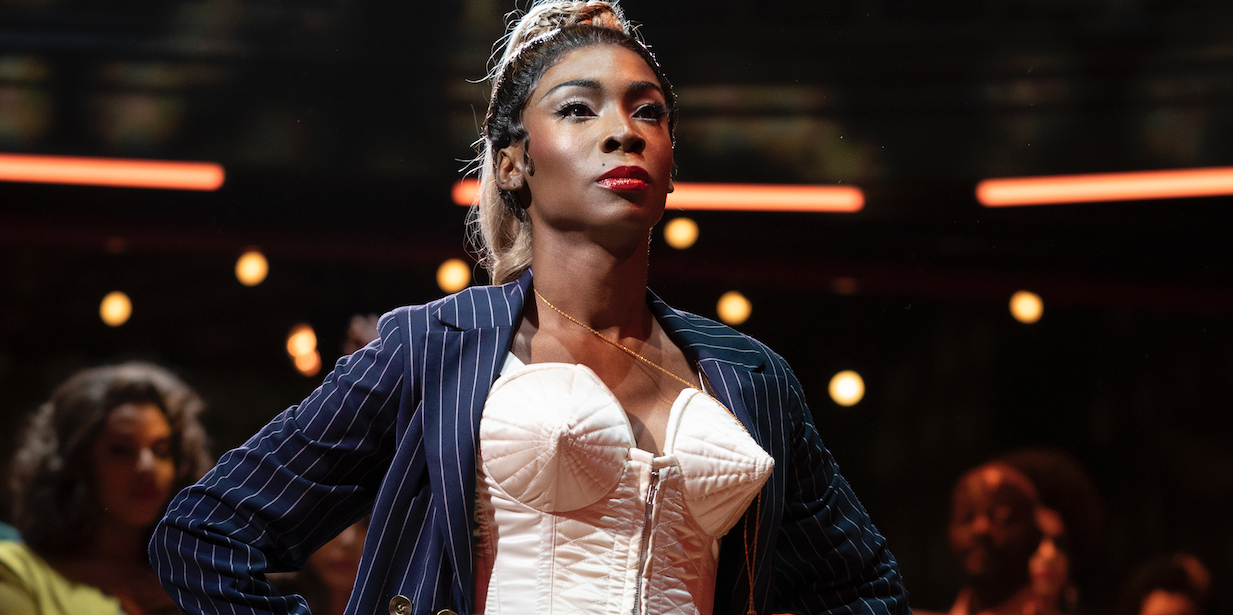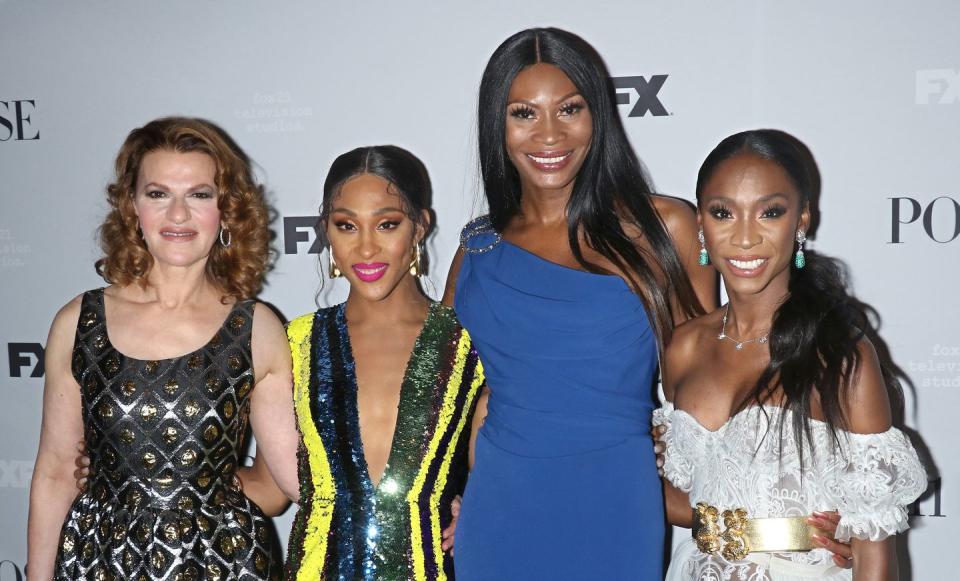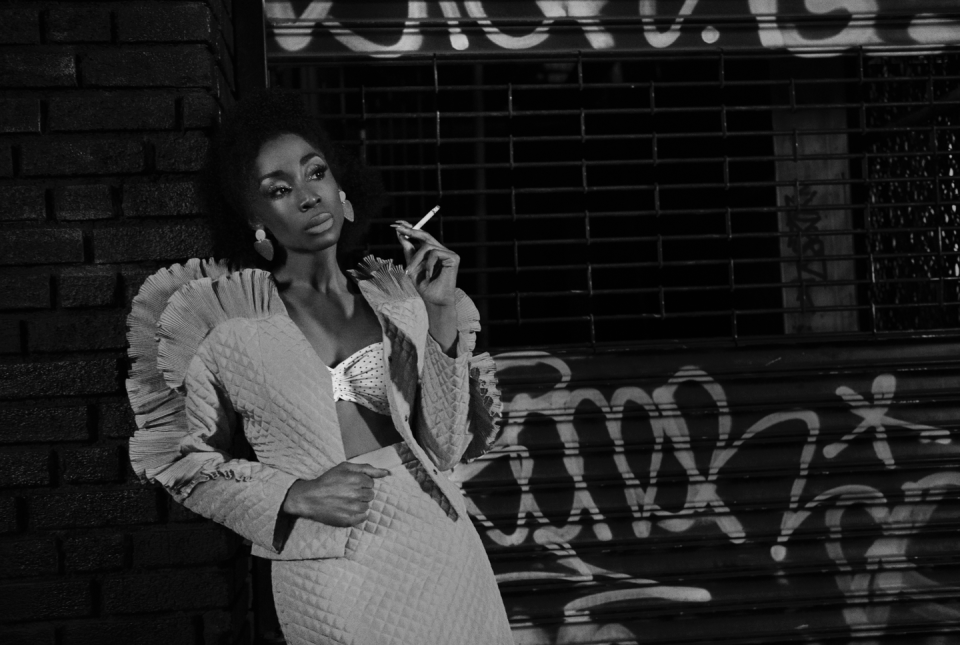Angelica Ross on Filming That Painful 'Pose' Scene

Warning: Contains spoilers for Pose season 2, episode 4.
“Why me?” That's the question Angelica Ross, who plays Candy from the House of Abundance on the hit FX show Pose, asked herself after her character met an untimely death on tonight's episode. It's a question that also points to the realities for trans women of color in the 1980s—and today. “It's usually the dark-skinned, black, trans women that are being murdered," Ross says, "and out of that group, that would be me. That would be Candy.”
This year, ten trans women have been killed; 72 per cent of trans homicide victims between 2010 and 2016 were black trans women and femmes, according to Mic. But Ross insists that these women not be reduced to a statistic, because there are many trans women of color that need our help right now. In a final scene, Candy sums it up by urging her ballroom family to not “waste your time missing me and ‘use that energy on a Candy girl out there.’”
Ross opened up to ELLE.com about shooting her devastating final scenes, how her own story is reflected in Pose, and what we can do to support trans women of color.
How did you find out about Candy’s passing? Were you shocked when you got the script?
It was a complete shock to me, and I knew before I read it in the script. [Pose co-creator] Ryan Murphy called me personally, and wanted to give me the news firsthand and explain to me the reasoning behind it all, but there wasn't too much explaining that he had to do. I understood why.
I also felt up to the challenge—because I knew it was going to be very challenging to film the episode, emotionally—and making sure we got everything right. But it was bittersweet because I knew that saying goodbye to Candy was also me saying goodbye to the family that I had built while filming Pose.

The final funeral scene includes wonderful conversations between Candy and each character. Were you part of the writing process?
With Candy, throughout the seasons, even though I have not been in the writing room, they have given me a lot of free range to change and write my own lines. But the writing for the conversation with Candy's parents during the funeral scene, I didn’t even touch. I didn't even rehearse it. I barely memorized the lines, meaning I had to memorize the lines on the day of, because they were just too raw. It was too real. Ryan came up to us and asked us if we needed to rehearse it, and we were like, "No, let's just film it."
You auditioned for Blanca and Elektra. What about Candy felt like the perfect fit for you?
They met me, and then wrote Candy for me, so I didn't see a script. Initially they just knew that they wanted me as a part of the children, but my role expanded because when Ryan Murphy's light bulb goes off, he starts writing more and more. He started writing based on my abilities—on set, he would say, "Angelica, you say something. Make up something catty," or "Say something funny.” So from the first episode, I was ad-libbing.
Is she similar to you?
Candy is to Angelica Ross as Sasha Fierce is to Beyoncé. She's become my alter ego in a sense. Playing Candy allowed me to unleash. It allowed me to play, and be the girl who was impulsive and who said all the things that people are thinking but nobody feels like it's appropriate to say. She's there within me somewhere, and I know that girl. I've grown up with those girls on the streets, when I was coming up as a black trans woman. So all of that is there, within myself.
Candy fought for equality, but also struggles with her own body image, and she decided to get unregulated injections and fillers. That feels so relevant to what women deal with, even today. How did you want to bring that balance and perspective to the character?
There's that saying that when you focus on the very specific, you can reach the universal. I knew by addressing body issues in such a way, where this was about survival for us and for trans women, and now today we have women who are not trans also pumping their bodies and getting sick from these things—we are all risking our lives. And for what? This is all to either be safe from a man, or to be chosen by a man, or to be seen by a man.
And it gets us, as women, to look at each other and say, "What are we doing here?" We all have this same want and need to be loved and to be seen, but it shouldn't have to cost our lives. That is a message I hope will resonate with the storyline, and with what's going on today with black trans women.

Candy's death explores the danger trans women faced in the 1980s, 1990s, and still face today. What was it like to portray such an intense scene?
One of the questions that came up for me, and that's going to come up for a lot of people is why. I was thinking, “Why me?” That question really crystallized why this was going to be so important. I think that America is not moving as fast as it should be moving on a lot of issues, from immigration, to abortion, to trans issues, because they're not questioning: Why not me?
In a situation where black trans women are being killed, who am I to think that I'm so special, that I would make it out alive? It's usually the dark-skinned, black, trans women that are being murdered, and out of that group, that would be me. That would be Candy.
I knew that so many people relate to Candy as this girl in the ball that has to be tough with a hammer in her purse. I knew that it would be important for me to tell the storyline. It broke my heart. I cried more than I've ever cried, probably, in my life. I was crying the entire time, filming it. I had to pretty much quarantine myself most of the time from people while doing it because I was so sensitive; anything you did or said to me, I could start crying.
For all the fans who have turned Candy into their chosen family, for all the folks who are going to care, I want that line to hit, where she says, "Don't waste your time missing me. Use that energy on a Candy girl out there."
That's what I really want the fans to do—not waste their energy missing Candy, although I love the love, and Candy would love the love, I'm sure. But to also think about how they can use that energy on black trans women that are struggling right now, today.

Layleen Polanco Xtravaganza died recently at Rikers. Trans women of color are dying at an alarming rate. What can we do?
What I would say is to protect black trans women like you would protect your own child, because the reality is that we are someone's child, and we have to learn to love one another and protect one another, as if we had some sort of responsibility to one another. Which, in the grand scheme of things, we do.
At the very least, it comes down to creating safe space for trans people, and that's 24/7. What ways can you help to create safe space? Is this a safe shelter? Can I walk in and breathe for five minutes, or get an education, or get something to eat, or just even a safe space?
To be innovative about it, it comes down to technology to help keep trans people and sex workers safe, and to decriminalize that, and to create technology [to ensure] they don't have to be on the street, vulnerable to violence, and to drug abuse. They can be behind a computer screen.
You founded TransTech to help trans individuals get into the tech field. What was the inspiration behind that program?
Many folks in our cast and crew have spoken—Janet Mock in particular, in her book—about the fact that for many of us trans women, on our path to womanhood is sex work. It just is what it is, and for many of us, we had to learn how to release the shame around that.
For me, part of releasing that shame was learning to not shame myself, but to empower myself by saying, Let me start by not allowing someone else to exploit me, and if I'm going to be exploited, let me control the rate, and how much that costs.
Before I could even get it started, the woman who owned the adult website noticed that I was savvy on the computer. She asked me to become her webmaster, instead of posing on the website. So I started learning how to become a webmaster, and then I became self-taught, learning from videos online. That was my organic pathway out, and it was through that, that I created a blueprint for TransTech. It doesn't even have to be this computer program. It can be graphic design. It can be data entry. It can be anything from very low-level skills to very high-level skills that gives folks an opportunity to set their own value and the pace of their own growth.
Candy’s family attends her funeral and her mom is reluctant but finally finds peace. How important is it for you to tell stories of both abandonment and reconciliation?
It's very important. My mom, who is not an actress, and she's not really even a public speaker, but yet, she accompanied me on the red carpet for the season 2 Pose premiere. I'm trying to help my mom become an advocate in the space and to learn the responsibility of her own truth and story. There was a moment, which is on my Instagram, where we were talking about the reconciliation that we had, personally, and how that's being reflected on the show.
A post shared by Miss Ross (@angelicaross) on Jun 6, 2019 at 10:49am PDT
I've been telling my mom for years, "Mom, there are so many mothers out there who are Christian like you, who are still holding onto their faith, who need to understand how you reconciled your faith with your love for your child. How did you get from point A to point B?" We do need to create space for shows like Pose to be able to send out the messages that we haven't been hearing and that we need to hear.
Below, a number of organizations that aim to stop the violence against trans individuals.
GLAAD: Advocates for transgender people to be represented fairly, accurately, and authentically in all forms of media.
National Center for Transgender Equality (NCTE): Advocates for the need for policy change in order to advance transgender equality.
Transgender Law Center (TLC): Largest national trans-led organization advocating self-determination for all people. With a commitment to racial justice, TLC employs community-driven strategies to keep transgender and gender nonconforming people alive, thriving, and fighting for liberation.
National Center for Lesbian Rights (NCLR) Transgender Law Project: Releases annual reports documenting their legal work in advancing the civil and human rights of lesbian, gay, bisexual, and transgender people and their families.
Transgender Law & Policy Institute: Brings experts and advocates together to work on law and policy initiatives designed to advance transgender equality. Responds by email to questions about how the law in your jurisdiction affects you.
Sylvia Rivera Law Project: Works to guarantee that all people are free to self-determine gender identity and expression, regardless of income or race, and without facing harassment, discrimination, or violence. Offers legal help with name changes, IDs, immigration, and more.
Trans Youth Family Allies (TYFA): Empowers children and families by partnering with educators, service providers, and communities to develop supportive environments in which gender may be expressed and respected.
Lambda Legal Transgender Parents Program: Resource that outlines the rights of transgender parents and offers a toll-free Help Desk for those who feel that they have experienced discrimination.
COLAGE: Kids of Trans Resource Guide: Resource guide aimed at helping children of transgender parents through the process of understanding and acceptance.
Resources courtesy of GLAAD.
Pose airs Tuesdays at 10 P.M. on FX.
('You Might Also Like',)

